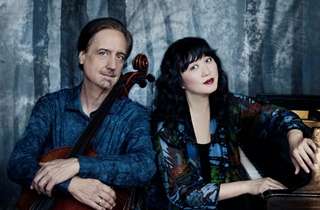|
Back
Some Transfigured Evening New York
Alice Tully Hall, Lincoln Center
11/15/2016 -
Wolfgang Amadeus Mozart: Quintet for Strings in C minor, K. 406
Arnold Schoenberg: Verklärte Nacht, Op. 4 (*)
Johannes Brahms: String Sextet No. 1 in B-flat major, Op. 18 (*)
Chamber Music Society of Lincoln Center: Sean Lee, Alexander Sitkovetsky (violins), Matthew Lipmann, Richard O’Neill (violas), David Finckel (*), Keith Robinson (celli)

D. Finckel, W. Han (© Lisa-Marie Mazzucco)
“...it is not the programme itself but the literary subject embodied in the programme that forms the topic of the music...The content is not pre-given but appears as a function of the form that shapes it.”
Carl Dahlhaus, Schoenberg and the New Music
Mozart transcribed his Quintet for Strings in C minor from an earlier wind serenade (the C minor, K. 388) and kept its upbeat feel (both original and transcription have two allegros). It is a natural curtain raiser and was employed as such by the Chamber Music Society of Lincoln Center in a concert projecting three very different styles and manifestations of musical beauty.
All of Mozart’s music is youthful by definition, the original of this piece constructed when the composer was 26. The remake is pure joy and was communicated as such by the quintet with Mr. Lee and Mr. O’Neill in first chairs and Mr. Robinson at solo cello. This interpretation was upbeat and celebratory, although much too modern of a sound for period “purists”. Simply delightful.
After such a rousing opening, CMSLC director Wu Han appeared and castigated the audience for not following that most cardinal of directions. Although everyone should know better, some perpetrator had kept their telephone powered up and the proposed recording of this evening’s artistry was invaded by an intrusive high-pitched whine. Ms. Han attempted a politic description of the story behind Dehmel’s original Transfigured Night to soften the blow, but this did not mask her justifiable ire.
Verklärte Nacht (Transfigured Night), written in 1899 when the composer was 26, is the last great work composed in the nineteenth century and, as poetic and revolutionary as it is, it does its composer Arnold Schoenberg a great disservice as it is almost always selected as the work to represent his magnificently forward-looking œuvre at most concerts that deign to include his works at all.
Although it is less “progressive” than many of his future compositions, Schoenberg made sure that this string sextet would be heard by as much of the public as he could ever command. The music is so rich that Gustav Mahler convinced him to craft a version for string orchestra that eventually took on a life of its own. This evening we heard the less lush but closer to the bone original version, a favorite of the composer who had earlier played the solo cello in a Viennese dance band that featured Fritz Kreisler (cf. the Ach du lieber Augustin reference in Schoenberg’s String Quartet No. 2). This was a sensitive performance, noted especially for its exquisite blending of voices. Mr. Sitkovetsky assumed the first chair and Mr. Finckel (the co-director of the society) joined as second cello.
Johannes Brahms grew up poor in the dockside neighborhood of Hamburg and made a meager living as a teenager playing the piano in somewhat seamy drinking establishments. There is no doubt that sea shanties were a part of his repertoire and the early String Sextet No. 1 includes snippets from some of this highly masculine repertoire.
Again the group captured the spirit of the work as well as navigating the notes with disarming ease. Lee, Lipman and Robinson were in the first chairs and all combined for a full-bodied rendition of this youthfully exuberant work written, you guessed it, when the composer was 26!
Fred Kirshnit
|